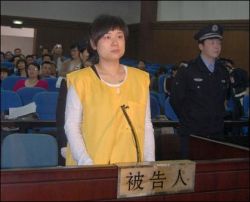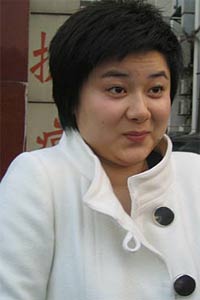Difference between revisions of "Wu Ying"
imported>Ciic |
imported>Ciic |
||
| Line 7: | Line 7: | ||
Born on May 20, 1981, to a farmer’s family, Wu experienced hardship in adolescence when her father was owed millions of yuan by a developer. She earned her first fortune by selling sheep placenta essence. Several years later, she used profits from a car leasing business and South Korean clothes boutiques to acquire the Sheraton Entertainment Complex in [[Zhejiang]]. She established lots of connections when doing business with her partners and her network provided her access to much insider information. | Born on May 20, 1981, to a farmer’s family, Wu experienced hardship in adolescence when her father was owed millions of yuan by a developer. She earned her first fortune by selling sheep placenta essence. Several years later, she used profits from a car leasing business and South Korean clothes boutiques to acquire the Sheraton Entertainment Complex in [[Zhejiang]]. She established lots of connections when doing business with her partners and her network provided her access to much insider information. | ||
| − | Unsatisfied with mere entrepreneur status, Wu ventured into the real estate and futures markets. Her shrewdness and audacity soon made her a rich woman in her hometown, Dongyang, | + | Unsatisfied with mere entrepreneur status, Wu ventured into the real estate and futures markets. Her shrewdness and audacity soon made her a rich woman in her hometown, Dongyang, Zhejiang Province — cradle of Chinese entrepreneurs. |
| − | However, the village woman’s epic rise crashed in February 10, 2007, when police cracked down all her chain stores and charged her with illegal fund-raising. On December 18, 2009, she was sentenced to death by the Jinhua Intermediate People’s Court in | + | However, the village woman’s epic rise crashed in February 10, 2007, when police cracked down all her chain stores and charged her with illegal fund-raising. On December 18, 2009, she was sentenced to death by the Jinhua Intermediate People’s Court in Zhejiang Province. |
Wu was found to have illegally raised 773.4 million yuan ($122.4 million) by promising investors high returns between May 2005 and February 2007. Of the money fraudulently pooled, 380 million yuan could not be returned and large amounts of other debts were unpaid, according to the court. | Wu was found to have illegally raised 773.4 million yuan ($122.4 million) by promising investors high returns between May 2005 and February 2007. Of the money fraudulently pooled, 380 million yuan could not be returned and large amounts of other debts were unpaid, according to the court. | ||
Revision as of 00:55, 22 May 2012
Wu Ying (吴英) is a Chinese entrepreneur and investor, who has been charged for fraud and embezzlement and now faces a death sentence.
A technical school drop-out, Wu started her business from a small beauty salon which eventually became the entertainment conglomerate, Bense Group Co. She became the 6th richest women in China in 2006, according to the Hurun Fortune List.
Born on May 20, 1981, to a farmer’s family, Wu experienced hardship in adolescence when her father was owed millions of yuan by a developer. She earned her first fortune by selling sheep placenta essence. Several years later, she used profits from a car leasing business and South Korean clothes boutiques to acquire the Sheraton Entertainment Complex in Zhejiang. She established lots of connections when doing business with her partners and her network provided her access to much insider information.
Unsatisfied with mere entrepreneur status, Wu ventured into the real estate and futures markets. Her shrewdness and audacity soon made her a rich woman in her hometown, Dongyang, Zhejiang Province — cradle of Chinese entrepreneurs.
However, the village woman’s epic rise crashed in February 10, 2007, when police cracked down all her chain stores and charged her with illegal fund-raising. On December 18, 2009, she was sentenced to death by the Jinhua Intermediate People’s Court in Zhejiang Province.
Wu was found to have illegally raised 773.4 million yuan ($122.4 million) by promising investors high returns between May 2005 and February 2007. Of the money fraudulently pooled, 380 million yuan could not be returned and large amounts of other debts were unpaid, according to the court.
Wu splurged lots of the money on properties, cars and luxuries and lost in the futures market.
The illegal fund-raising involves a number of local government officials and bankers who allegedly embezzled public properties for the coveted rewards. One of the highest officials that Wu identified as participating in the scheme was a vice mayor in the province.
Questioning the verdict, Wu filed an appeal against her death sentence, which according to her, was intended to protect some of the lenders. However, on January 18, 2012, four days ahead of the Chinese Lunar New Year, the Zhengjiang Higher People’s Court upheld the previous sentence and sent the lawsuit to the Supreme People’s Court to exam.
Wu’s death penalty sparked waves of public controversy. Many bloggers questioned the real intention of the court.
Chinese scholar Yi Zhongtian wrote in his weibo microblog (China’s equivalent to twitter): “I know nothing about finance or law, or Wu’s lawsuit. But here’s two points I’m clear of: First, economic criminals are rarely sentenced to death—that’s the basic legal and juridical principle. Second, part of the lawsuit remains unclear and the legal references are contentious.
“Under such conditions, is it so urgent to implement the death penalty to Wu? Rational and compassionate people would all say no,” Yi wrote.

